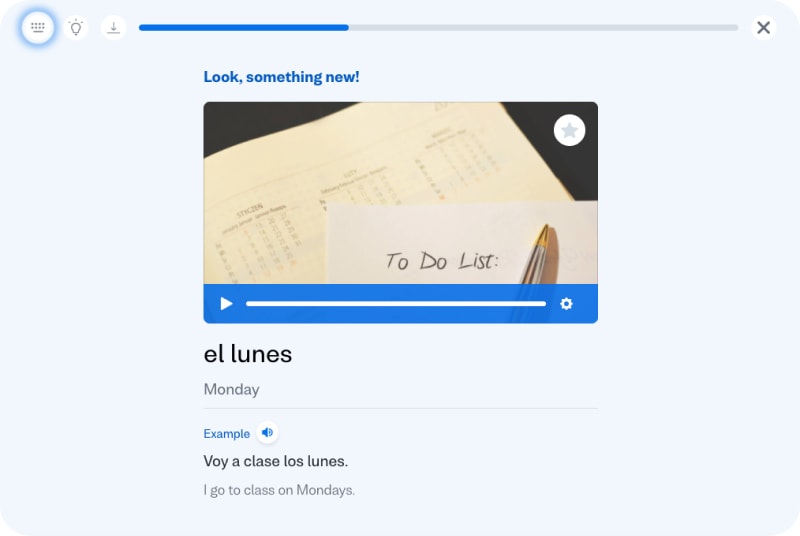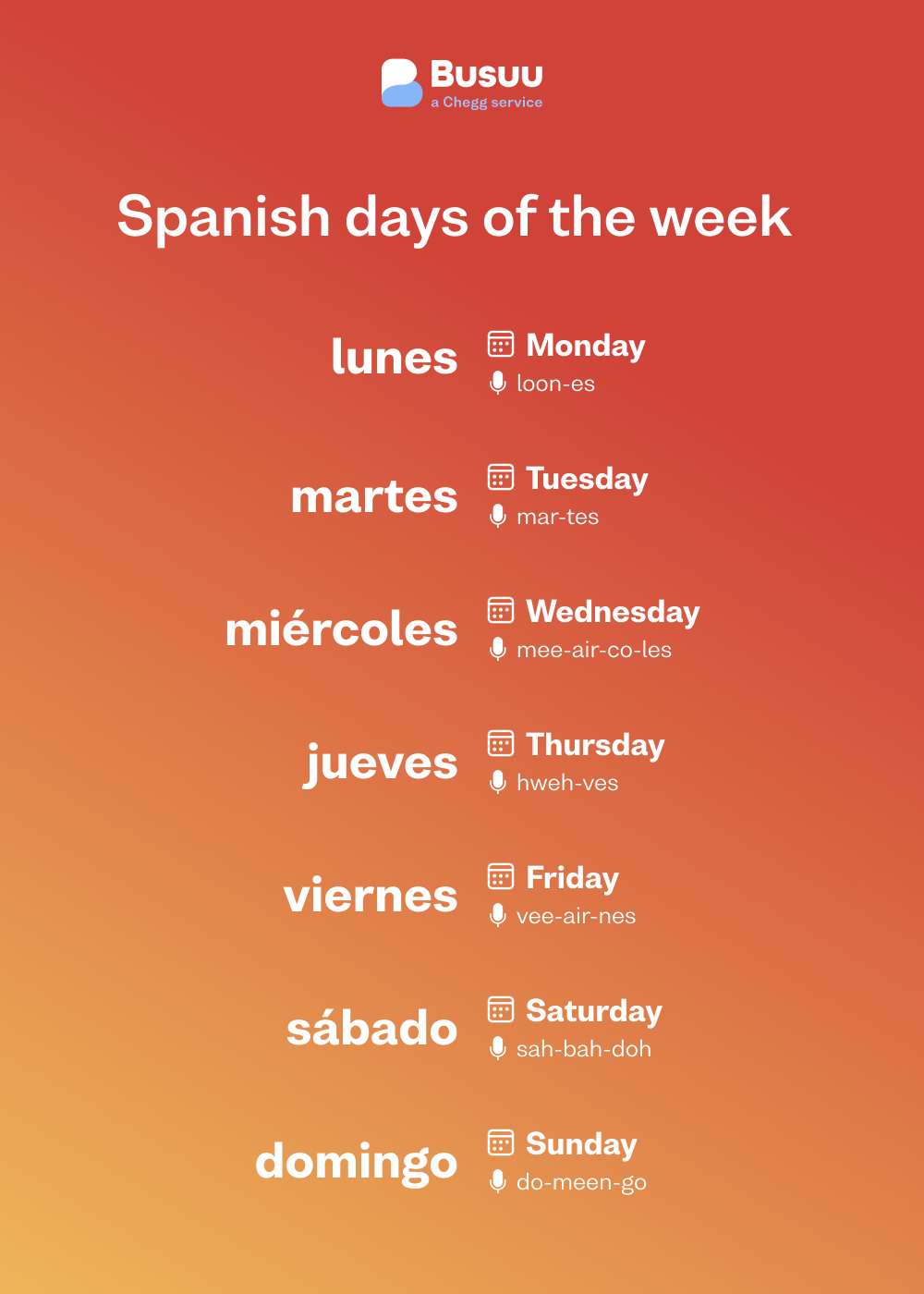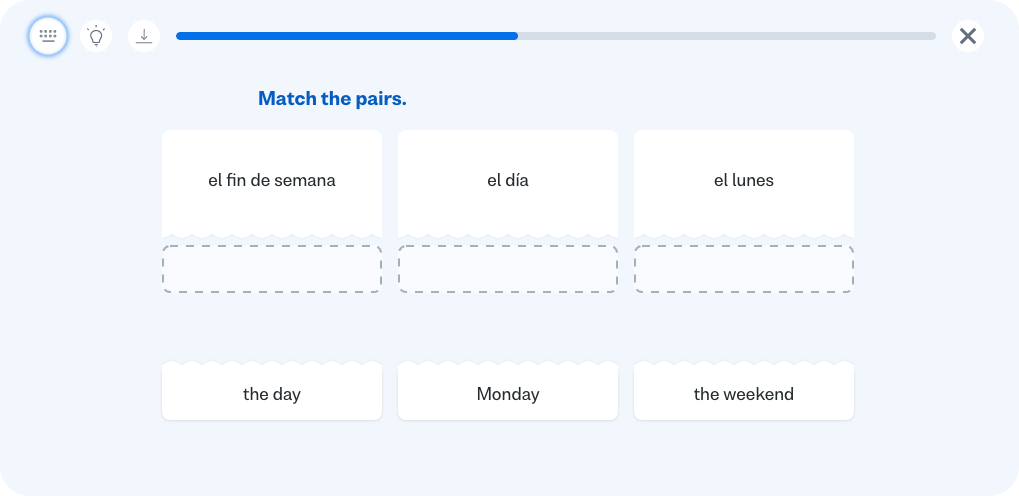Spanish Days of the Week Easy Learning for Beginners
Memorise Spanish days of the week
Remember the Spanish names for the days of the week with these top tricks.
For Spanish learners, it's handy to learn the Spanish days of the week. After all, if you don't know what day your friend wants to meet, your class will take place, or your new boss wants you in the office, it'll be hard to get much done.
Fortunately, it's easy to learn the Spanish names for the days of the week. In fact, you'll be well on your way to remembering them by the time you finish reading this article! We'll teach you how to pronounce, remember and use the Spanish days of the week.
So why don't we get started?


Introducing the Spanish days of the week – and an ingenious way to remember them
When we look at the Spanish week, names for the days might seem unfamiliar, but they actually come from many of the same sources as the English days of the week! Learning these sources can help you remember them, so let's take a closer look.
Monday – lunes
Monday comes from the word "moon" in German. Lunes comes from luna, the Spanish word for moon. Monday? It's a moon day.
Tuesday – martes
In English, Tuesday is named after Tyr, the Norse god of war. Martes comes from Mars, the Roman god of war. Tuesday is a day of 'making war'.
Wednesday – miércoles
Our words for Wednesday don't have much in common, but if you know the Roman pantheon of gods – or the names of the planets – you can remember that miércoles is for Mercury, the Roman god of messages and communication. On Wednesdays, we send messages.
Thursday – jueves
In English, Thursday is Thor's day. In Spanish, it's Jupiter's. If you know your gods of thunder (...do you?), you'll know that these two have a lot in common. On Thursday, we jump from the thunder.
Friday – viernes
Friday matches up with another planet and Roman deity – Venus. Friday night is date night, after all, and Venus is the goddess of love.
Saturday – sábado
Saturday is named sábado for the sabbath, a day of rest. Sábado, sabbath, the first day of the weekend! On Saturday, we take a break.
Sunday – domingo
And, last but not least, Sunday is domingo, derived from the Latin Domenica. It's another Biblical root, meaning "The Lord's Day". That's the root, but if you're not into religion, you could also think of it as a day to celebrate Domingo Faustino Sarmiento, the nineteenth-century Argentine activist and intellectual.
Chart for remembering the Spanish days of the week
| English | Spanish | Pronunciation | Remember... |
|---|---|---|---|
| Monday | lunes | loon-es | moon |
| Tuesday | martes | mar-tes | Mars (war) |
| Wednesday | miércoles | mee-air-co-les | Mercury (messages) |
| Thursday | jueves | hweh-ves | Jupiter (thunder) |
| Friday | viernes | vee-air-nes | Venus (date night) |
| Saturday | sábado | sah-bah-doh | Sabbath (break) |
| Sunday | domingo | do-meen-go | Domingo (my friend) |
Stop right there...

"Wow, this is a lot of information about the days of the week." We'd totally understand if you want to jump right into putting what you've read into practice
There's no need to wait around. You can get started right now on Busuu with our interactive lessons.
Spanish days of the week in context: 6 things you need to know
Ok, now you know how to say the seven days of the week, but how do you put this new knowledge into action? We've compiled a few important rules and pieces of information you'll need if you want to start chatting schedules with your Spanish speaking friends.
1. Skip the "on"
In English, we say that we do things "on Monday", "on Saturday nights," and so on. But in Spanish, we use el or los (the) in place of on – and nothing else. Here's what that looks like:
-
El martes voy a comer con mi abuela.
"On Tuesday I'm having lunch with my grandma." -
Los sábados corro por el parque.
"On Saturdays I run in the park."
(You might be tempted to throw in an en. Don't do it!)
2. Start with Monday
In the English speaking world, calendars often start on Sunday. In Spanish speaking countries, however, the week starts on Monday – just like the working week.
The chart you learned from above has the Spanish days of the week in order. The bunny starts on the moon, and so should you. Easy enough to remember, right?
Worth noting: while the English short form for the 7 days of the week looks like this, starting at Sunday and ending with Saturday:
S M T W T F S
In Spanish speaking countries, it goes:
L M X J V S D
It starts on lunes and ends on domingo. X represents miércoles to avoid confusion with martes. So if you get a class schedule that asks you to show up at 9 am on L and X, you know that's lunes (Monday) and miércoles (Wednesday).
3. Capital letters not (usually) required
You might have noticed this already but when we say the days of the week (you know, lunes, martes, miércoles...) in a sentence, we don't capitalise them unless they appear at the beginning of the sentence. Like how the work 'like' is capitalised at the beginning of this sentence, but not anywhere else. You get the idea.
Not capitalised
- Nos vemos el lunes.
"See you on Monday."
Capitalised
When writing the date at the top of a letter:
- Lunes, 16 de agosto de 2021
"Monday 16 August 2021"
4. It's a boys' club
Learning Spanish means memorising a lot of genders. But the days of the week are all masculine, so they're fairly easy. That means we always use el, los, un, or algunos to refer to them.
5. Pluralise as usual
Pluralising the days of the week adheres to standard Spanish rules for pluralisation. We change the article – for example, el becomes los – and, for sábado and domingo, since they don't already end in -s, we add an -s. The names of the days that end in -s stay unchanged.
Here's what that looks like:
- el martes → los martes
- el domingo → los domingos
6. Use ser
When we talk about the days of the week in simple sentences, we typically use the verb ser. So, for example, anywhere you'd use "is" in English (the present and future), you'd typically use es.:
-
Hoy es miércoles.
Today is Wednesday. -
El próximo jueves es mi cumpleaños.
Next Thursday is my birthday.
And we use the past tense of ser, fue, to talk about days in the past.
-
Ayer fue martes.
Yesterday was Tuesday. -
El martes fue un buen día.
Tuesday was a good day.
And now you know all about the Spanish days of the week
With all this new knowledge, you're ready to go out and book coffee dates, sign up for boat tours, and anything else that requires intimate knowledge of how to say 'Monday'.
Pop quiz! What day is it today?
But there's so much more to Spanish than scheduling
Busuu's online Spanish course is the place to find more essential, everyday language you'll actually use like this.
Don't put it off 'til next sábado. Take your Spanish to the next level with Busuu.
Source: https://www.busuu.com/en/spanish/days-of-the-week
0 Response to "Spanish Days of the Week Easy Learning for Beginners"
Post a Comment